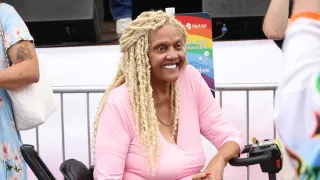May 31, 2015
Plan Progresses to Review Homeless Deaths
Kilian Melloy READ TIME: 4 MIN.
San Francisco officials are planning a process to review the deaths of homeless people in the city in order to see if more can be done to prevent future cases.
City staff who deal with homelessness and health met last week as a homeless death review committee is established. The progress follows the death of Anastasia Walton, 50, a transgender woman who died New Year's Eve outside the Peet's coffee shop in the Castro. Walton died of a heart condition, according to the medical examiner's office, which recently released its review of Walton's death.
People who knew Walton have said that she had repeatedly declined offers of shelter and other services. But Bevan Dufty, who serves as director of Housing Opportunity, Partnerships and Engagement for Mayor Ed Lee and who's been involved in establishing the panel, said in January that Anastasia's "tragic death can be a rallying point to make sure we don't leave people behind."
Dufty, a former city supervisor, has been working for months to restart the review committee, which was last in place several years ago.
An overview of the panel provided by the HOPE office's Sam Dodge says homeless people "frequently have received services from many service providers, but the service providers are unlikely to know about their death and unlikely to do [quality assurance] review" or other examinations.
"Homeless deaths can be treated as other sentinel events in our health care system as a trigger for quality improvement," the overview says.
There will be quarterly reviews, and Dodge said in an email that the first will be the week of August 10.
The review process will start with the medical examiner's office notifying the medical director of the city's homeless outreach team when a homeless individual dies, according to the outline Dodge provided.
People who don't have a fixed address, including those whose address is a homeless shelter, and people who are known to live on the street but have temporarily been staying in a single-room-occupancy hotel, are among those who will be included.
Information on the cause of death or circumstances related to it that can be shared will be included. Confidential details related to possible criminal investigations won't be disclosed.
The outreach team's medical director will check health department data to see if any of the agency's programs have provided care to the person.
In cases where there's no record, data would be brought to the outreach team's clinical leadership for discussion.
When records are found, additional information "as to whether the death had any preventable aspects" may be obtained from the person's primary care provider and other health workers, the committee overview says.
Other steps may include outreach team clinical leaders discussing improvements to service so that similar deaths are prevented.
If the person who died isn't someone outreach staff has worked with, the team will talk about how to contact people who're facing similar risks.
There will be quarterly meetings to talk about recent deaths or trends. People from the medical examiner's office, the outreach team, the HOPE office, city homeless programs, and others may be invited. Other meetings may be called if needed.
"30 to 100 Deaths Annually"
In an interview Thursday, May 21, Dodge said that based on the work of the previous committee and the sharing of information between agencies, there "could be 30 to 100 deaths annually" for the committee to review. There will likely be an annual report.
The panel isn't yet reviewing any cases, but Dodge said he's "very interested in learning" about Walton's death.
"I think that would be a great case to review," he said.
So far, other agencies have been cooperative, Dodge said.
"It's been nice to see everyone's been on the same page, as far as openness to sharing and working on this," he said, adding that "there hasn't been any obstruction or hand-wringing about what the information would bring." People seem willing "to look at all that information and use it to improve what we're doing," he said.
In response to emailed questions, acting Medical Examiner Administrator Christopher Wirowek said his office is talking to officials with the outreach team and others to establish the quarterly review, which Chief Medical Examiner Dr. Michael Hunter will facilitate.
"The key objective of this quarterly meeting is to focus on deceased individuals who may have resided and/or died in an encampment, temporary housing, or shelter facility" in the city, Wirowek said. "Discussions may potentially include decedents who have utilized, or even declined, Department of Public Health services."
The review committee may be able to reach out to those who knew the people who died and find ways to help them.
The medical examiner's office "is establishing protocol in order to share key social information with members of the homeless outreach team to provide more timely accessibility to the social services made available" through the health department, Wirowek said.
If it's appropriate, workers may reach out to other homeless people who knew the person that died and see if they're open to help, Dodge said.
Asked whether there could be punishment for staffers in cases where it's found they could have taken more action before someone's death, Dodge said, "I don't want to preclude" anything.
"The intent is to really improve the work that we're doing and to decrease the amount of people that end up dying due to conditions of their homelessness," he said.
Dodge said the committee got underway Tuesday, May 19.
Rachael Kagan, a health department spokeswoman, said in an email exchange Thursday, May 21, "There has been a meeting ... to start the planning process." but that's "not the same as the committee itself starting this week."
Kagan said it's premature for Dr. Barry Zevin, the homeless outreach team's medical director, to comment.
"We at DPH are working with the medical examiner's office on developing a plan for the review of homeless deaths," she said. "Similar efforts are already taking place in New York City and Philadelphia, and we look forward to making progress here."
Dufty, the HOPE director, has explained the last review committee's end by saying the "medical examiner's office has had some peaks and valleys over the years, and this protocol was discarded." His comment was an apparent reference to past leadership problems at the agency.






